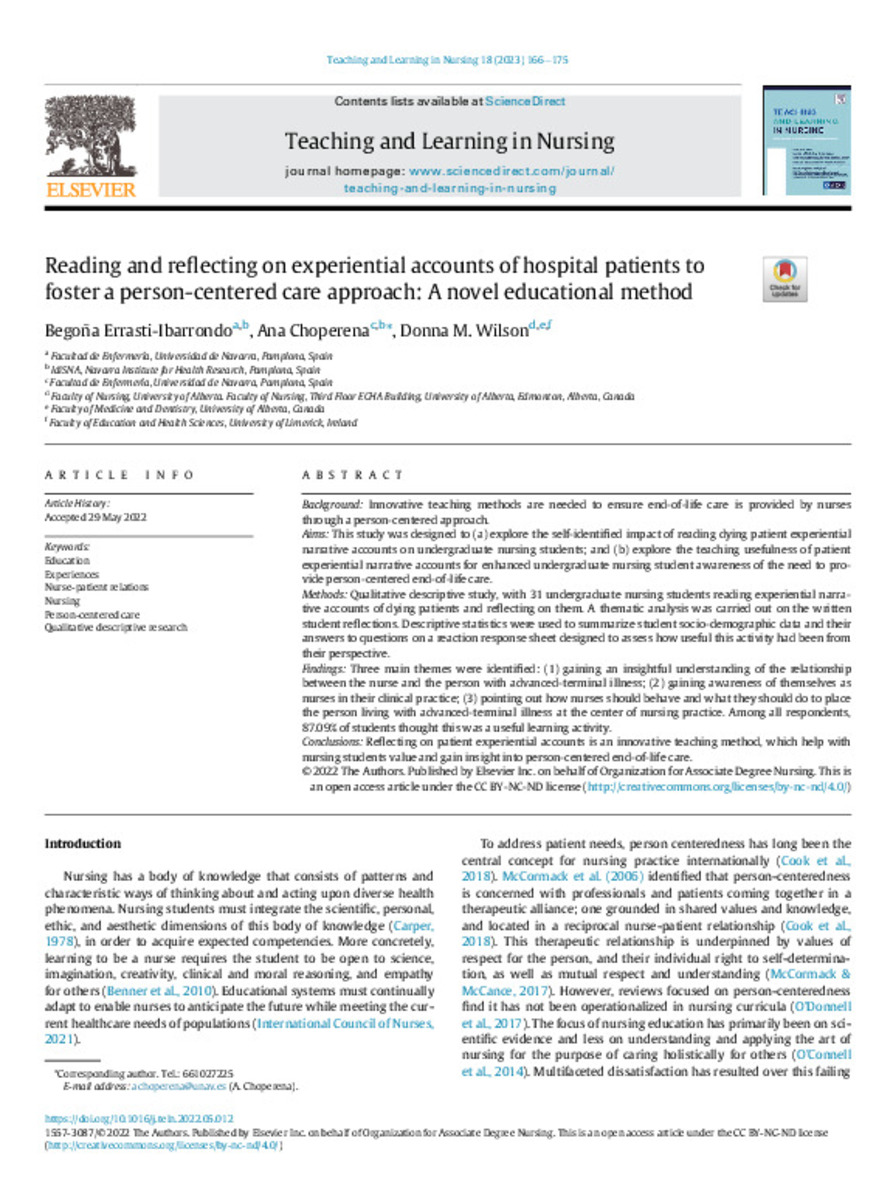Full metadata record
| DC Field | Value | Language |
|---|---|---|
| dc.creator | Errasti-Ibarrondo, M.B. (María Begoña) | - |
| dc.creator | Choperena-Armendáriz, A. (Ana) | - |
| dc.creator | Wilson, D.M. (Donna M.) | - |
| dc.date.accessioned | 2023-04-27T07:51:34Z | - |
| dc.date.available | 2023-04-27T07:51:34Z | - |
| dc.date.issued | 2023 | - |
| dc.identifier.citation | Errasti-Ibarrondo, M.B. (María Begoña); Choperena-Armendáriz, A. (Ana); Wilson, D.M. (Donna M.). "Reading and reflecting on experiential accounts of hospital patients to foster a person-centered care approach: A novel educational method". Teaching and Learning in Nursing. 18 (1), 2023, 166 - 175 | es_ES |
| dc.identifier.issn | 1557-2013 | - |
| dc.identifier.uri | https://hdl.handle.net/10171/66126 | - |
| dc.description.abstract | Background Innovative teaching methods are needed to ensure end-of-life care is provided by nurses through a person-centered approach. Aims This study was designed to (a) explore the self-identified impact of reading dying patient experiential narrative accounts on undergraduate nursing students; and (b) explore the teaching usefulness of patient experiential narrative accounts for enhanced undergraduate nursing student awareness of the need to provide person-centered end-of-life care. Methods Qualitative descriptive study, with 31 undergraduate nursing students reading experiential narrative accounts of dying patients and reflecting on them. A thematic analysis was carried out on the written student reflections. Descriptive statistics were used to summarize student socio-demographic data and their answers to questions on a reaction response sheet designed to assess how useful this activity had been from their perspective. Findings Three main themes were identified: (1) gaining an insightful understanding of the relationship between the nurse and the person with advanced-terminal illness; (2) gaining awareness of themselves as nurses in their clinical practice; (3) pointing out how nurses should behave and what they should do to place the person living with advanced-terminal illness at the center of nursing practice. Among all respondents, 87.09% of students thought this was a useful learning activity. Conclusions Reflecting on patient experiential accounts is an innovative teaching method, which help with nursing students value and gain insight into person-centered end-of-life care. | es_ES |
| dc.language.iso | eng | es_ES |
| dc.publisher | Elsevier | es_ES |
| dc.rights | info:eu-repo/semantics/openAccess | es_ES |
| dc.subject | Education | es_ES |
| dc.subject | Experiences | es_ES |
| dc.subject | Nurse-patient relations | es_ES |
| dc.subject | Nursing | es_ES |
| dc.subject | Person-centered care | es_ES |
| dc.subject | Qualitative descriptive research | es_ES |
| dc.title | Reading and reflecting on experiential accounts of hospital patients to foster a person-centered care approach: A novel educational method | es_ES |
| dc.type | info:eu-repo/semantics/article | es_ES |
| dc.description.note | This is an open access article under the CC BY-NC-ND license | es_ES |
| dc.identifier.doi | 10.1016/j.teln.2022.05.012 | - |
| dadun.citation.endingPage | 175 | es_ES |
| dadun.citation.number | 1 | es_ES |
| dadun.citation.publicationName | Teaching and Learning in Nursing | es_ES |
| dadun.citation.startingPage | 166 | es_ES |
| dadun.citation.volume | 18 | es_ES |
Files in This Item:
Statistics and impact
Items in Dadun are protected by copyright, with all rights reserved, unless otherwise indicated.






